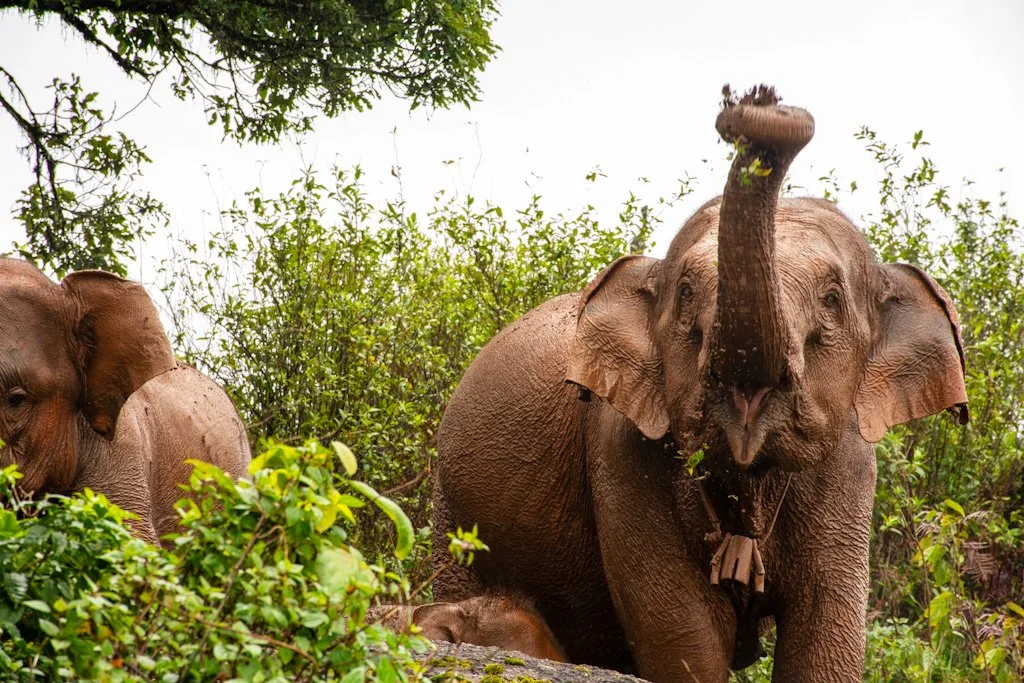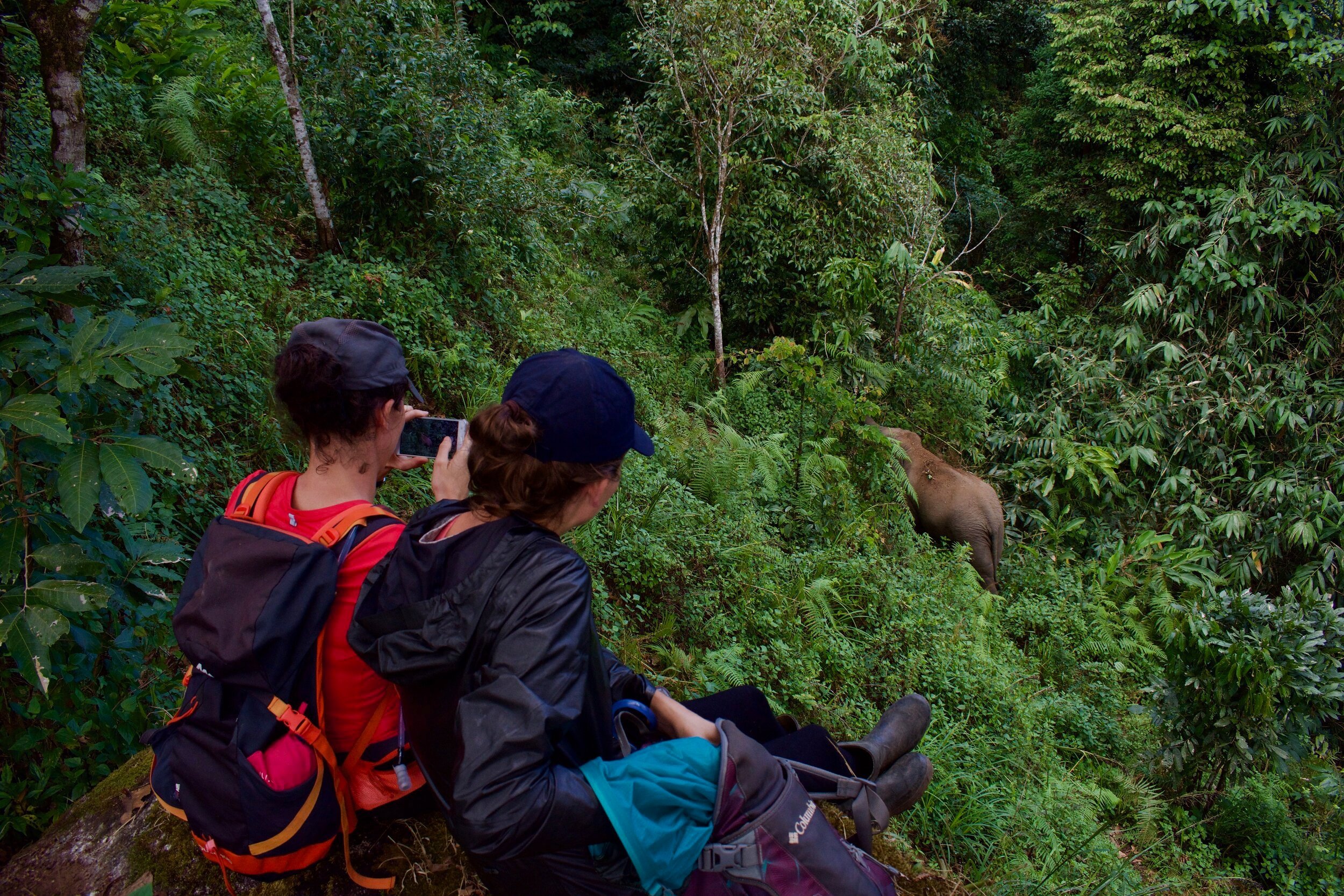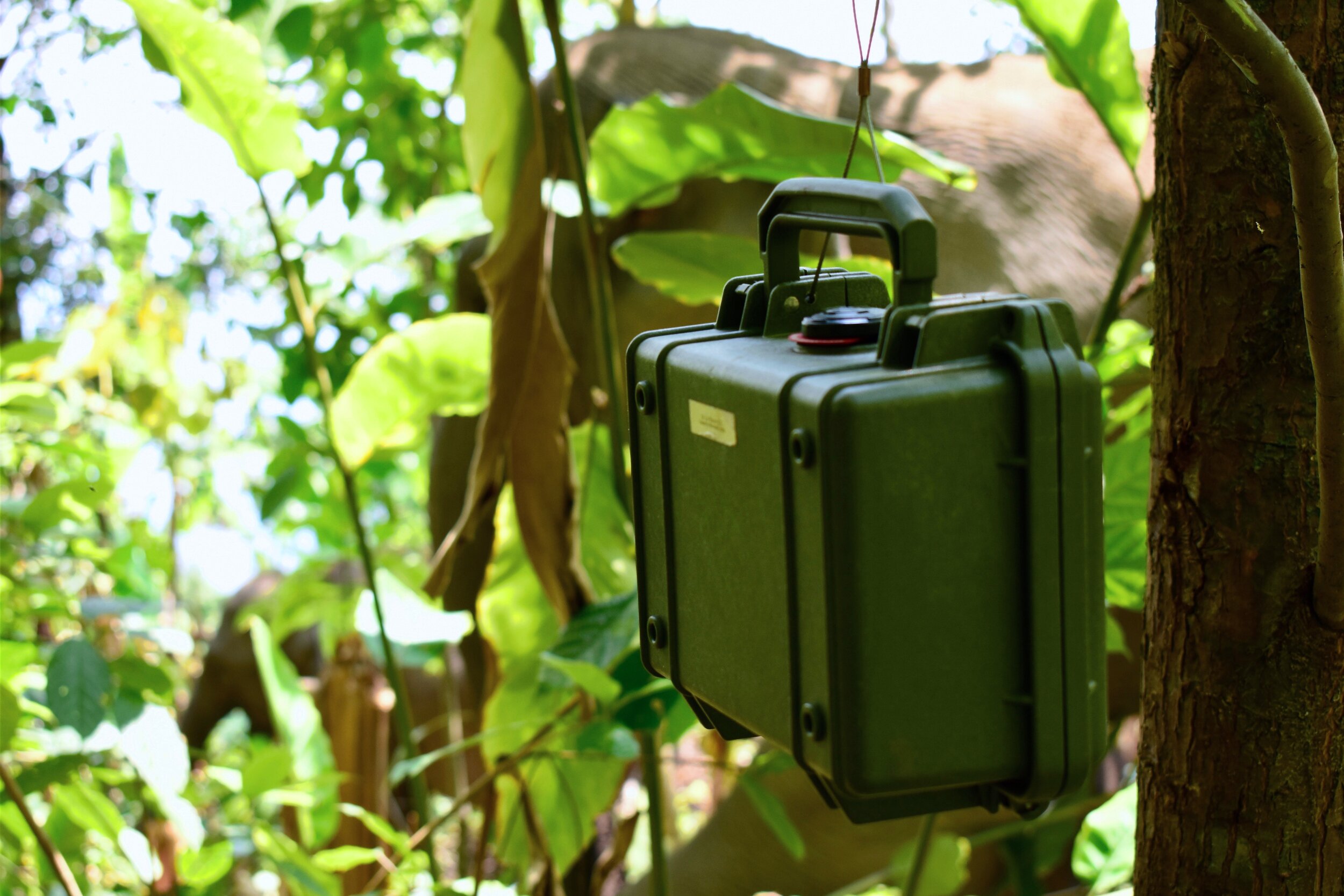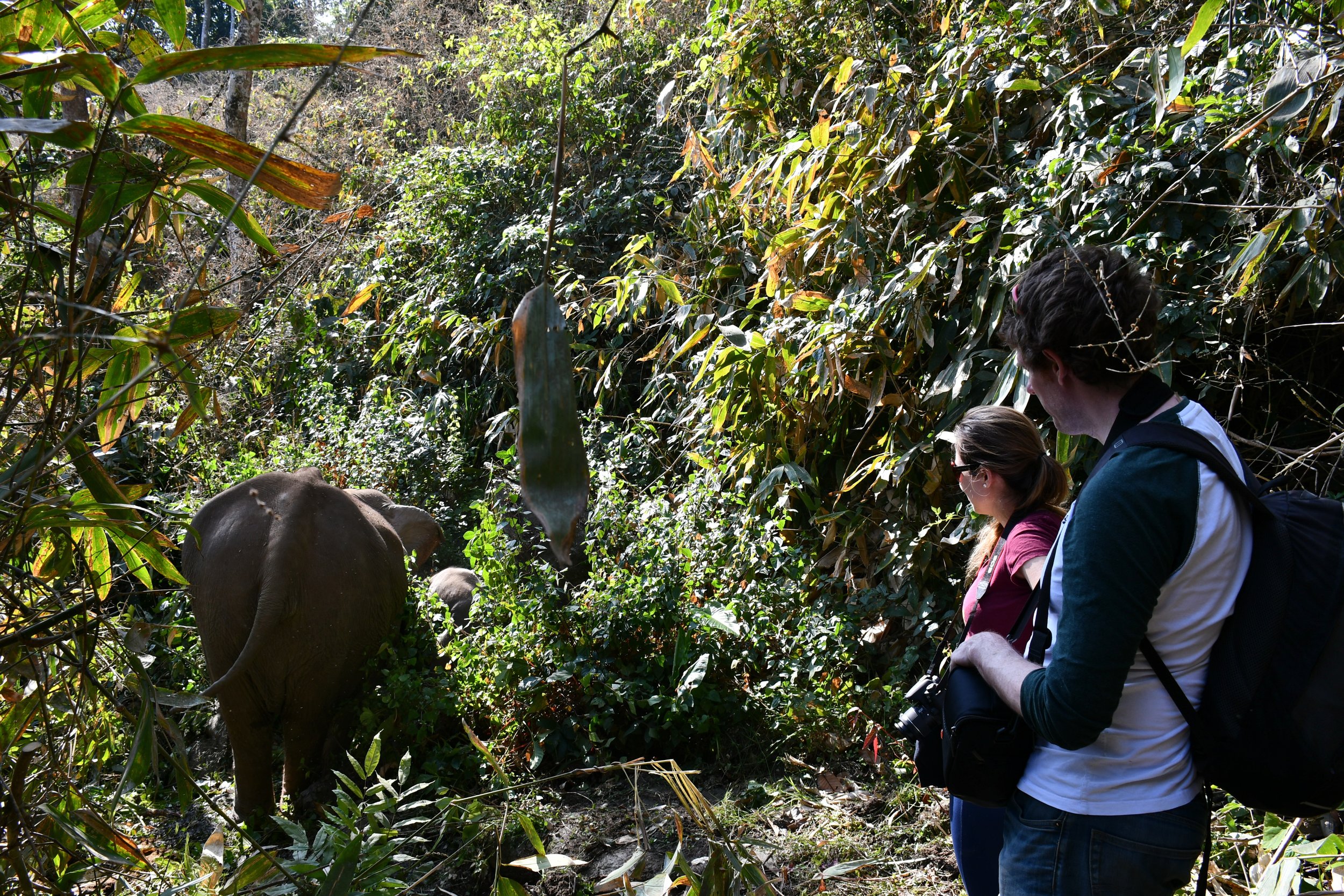Field Course 2026
Applications now open!
Applications now Open!
Rolling Admission until all spots are filled, apply early to secure your place!
Four Week Course: June 14 - July 10
Two-week sessions now available!
Session 1: June 14 - June 26, Session 2: June 28 - July 10
If you would like to discuss the course we are happy to arrange a call, please email sarah@mahouts.org
Course Information
About FDBEH301: Asian Elephant Behaviour and Community Driven Conservation in Thailand
This is a 4 week field course that offers university students the opportunity to join an ongoing research project studying the behavior and ecology of re-wilded Asian elephants in their natural habitat. Students will gain hands-on experience in animal behavior sampling methods, research design, and behavioral data analysis. Students will learn critical thinking and problem solving skills for implementing successful field research protocols, learn the fundamentals of recording and interpreting animal behavior, all while collaborating with indigenous mahouts (elephant keepers) and their community as they work to conserve the forest.
By promoting a multispecies approach to conservation, this course not only improves outcomes for animals and the environment, but also recognizes the interconnectedness of human health and well-being. In addition to participating in this vital research, students will have the chance to learn from expert staff, mahouts, and community leaders, and gain cultural immersion and language training in Sgaw Karen and Thai. Led by renowned conservation behaviorist Dr. Liv Baker, this program is perfect for students with a passion for biology, ecology, conservation, animal behavior, or animal welfare. Don't miss out on this once-in-a-lifetime opportunity to make a difference in the world – apply now for the summer 2025 session, running from June 15 to July 11. Apply using our online application
Who It’s For
The four week college level field course is designed for University-aged students (or above) who are interested in careers in conservation biology, animal welfare, veterinary medicine, and adjacent fields. Masters students and professionals in related fields are encouraged to apply. Applicants should be interested in community-driven conservation work, comfortable with hiking, and comfortable living in a rural/remote area for a short period of time. A background in the biological sciences is helpful, but not required! You do not need to be currently enrolled in university in order to apply. We welcome individuals of all nationalities. The course is capped at a maximum of 12 people.
Two Week Sessions
Every year we hear from interested participants that the four week session is a bit too long to fit into busy summer schedules, so this year we are offering two-week sessions for students interested in getting a feel for field research and community-driven conservation but aren’t available for the full four week course.
For More Information Contact Us Today
Curriculum Questions Contact: Dr. Liv Baker MEF Research director
Submit Applications Online: Application Link
Learn and practice field research skills with Asian elephants and indigenous elephant guardians
Spend time with an indigenous community safeguarding elephants
Observe elephant behaviors only visible in their natural habitat
Learn how elephant siblings and families interact
Full Course Description
FDBEH301: Asian Elephant Behaviour and Community Driven Conservation in Thailand explores how the science of animal behaviour and well-being can be used in conservation to improve outcomes for animals, people, and the environment.
Course participants will learn the fundamentals of behavioral observation and various sampling methods from instructor Dr. Liv Baker before having the opportunity to practice these skills in the field. Students will join an ongoing research project studying the behavior and ecology of re-wilded Asian elephants in their natural habitat, giving them the opportunity to observe foraging behaviors and social group dynamics that are only visible when elephants have access to their natural habitat. Students will gain hands-on experience in animal behavior sampling methods, research design, and behavioral data analysis while learning critical thinking and problem solving skills necessary for implementing successful field research methods. All of MEF’s research work is done in full collaboration with the indigenous community that stewards the forest and cares for the elephants. Students will have the opportunity to explore the complexities and challenges of real world, community-based conservation from an expert team that has been collaborating together for over a decade.
By promoting a multispecies approach to conservation, this course not only improves outcomes for animals and the environment, but also recognizes the interconnectedness of human health and well-being. Field course participants will learn from expert staff, mahouts, and community leaders about community-led conservation work. This is an immersive experience, where participants will be engaged in local culture, including language training in Sgaw Karen and Thai, and contributing to community conservation projects.
Studying Elephants in Their Habitat
MEF researchers and affiliated scientists have pioneered a longitudinal research program to study how re-wilded elephants live in the forest. This research is the first of its kind on Asian elephants and is a vital, compassionate step forward. Our research will advance the scientific community’s ability to conserve and protect Asian elephants worldwide. Accepted field course students will participate in this research program.
Life in the Field
As a field course participant, you will stay in local homestays in the village nestled within pristine cloud forest with breathtaking mountain views. The field site is in a remote Karen village in northern Thailand. The villagers speak S’gaw Karen and Thai. The accommodations are basic, clean and comfortable. Toilets are mostly western-style and showers are a traditional bucket bath. There is no running hot water in the village, and energy is all solar-based. Supported by MEF bi-and tri-lingual field staff, students will gain valuable cultural immersion experience – joining villagers in activities such as, rice planting, foraging for native vegetables, animal tracking, fabric weaving, forest crafts, and traditional meal preparation. Students will also gain language skills in Sgaw Karen and Thai through formal lessons as a part of the coursework, and by conversing with community members.
Expert Course Instruction
Course Instructor:
Dr. Liv Baker, conservation behaviorist and expert in wild animal well-being
Dr. Liv Baker works with Mahouts Elephant Foundation, directing their research program. Dr. Baker is a conservation behaviorist and an expert in wild animal well-being. Her research focuses on the role individual wild animals have in the health of their social groups and populations. Dr Baker’s work explores the similar patterns of well-being and behavior seen across the animal kingdom. Dr Baker’s conservation research projects involve a range of wild animals, including, elephants, primates, arachnids, rodents, and macropods. Dr. Baker is the Chairperson of the board of Panworks, a center for ethics and policy dedicated to the wellbeing of animals.
Dr. Baker will assist students with preparation for their field study and will join students for the first week of their field experience, providing on-site lectures and research guidance. After which, students will work on their individual projects with guidance from MEF facilitators and staff.
The Field Course is run in Collaboration with PAN Works
PAN Works is an ethics non-profit based in the US, providing a global platform for ethicists and scientists working to improve animal wellbeing. PAN Works cultivates compassion, respect, and justice for animals; a reverence for the community of life; and a desire for people, animals and nature to thrive together. PAN Works generates ethically informed, scientifically rigorous research articles, popular essays, courses, seminars, and workshops to build interdisciplinary knowledge useful to deliberative decision making.
Rolling Admission, only 12 spots available
SUBMIT YOUR APPLICATION TODAY!
Discover your passion for wildlife conservation
Embarking on field research is the best way to explore what a career in wildlife conservation looks like. There are hundreds of summer experiences for university students, but engaging in field research with real-world application provides invaluable experience that bridges the gap between theory and practice. We keep numbers small enabling personalized learning, tailored to each student’s individual research interests. Students have gone on from previous field courses to pursue graduate degrees inspired by this work, publish in academic journals, and kickstart their careers in wildlife conservation.
Learn from community conservation leaders, scientific experts, and elephant guardians
Join a cohort of passionate students from across the world!
Get to know our incredible staff, who have dedicated their career to protecting elephants and supporting indigenous communities.
Course Tuition, Room and Board:
Four Week Course: Starting From £3500 (Maximum £3800)
Two Week Course: £2000
Mahouts Elephant Foundation is a nonprofit organization (UK Registered Charity 1158956). We strive to make the course as affordable as possible within the constraints of staffing a very remote field site and fairly compensating all local collaborators. Please see below for links to general scholarships available. Most Universities offer scholarships/grant funding for summer research experiences. Contact your study abroad office or grant office to inquire about what your university offers.
Course Fee includes:
On-site accommodation in a village homestay and home-cooked meals (3x/day)
Thai welcome dinner in Mae Sot on night one
Program-related travel (ground transportation)
One on one guidance in research project development
Expert english speaking staff-participant ratio of 1 to 3 or below.
On site course instruction by Dr. Baker
Pre-trip orientation and support from MEF staff and Dr. Baker
Pre-trip readings and instruction from Dr. Baker
Welcome pack on arrival with program T-Shirt and Water bottle
Course-specific language materials created by MEF collaborating anthropologist
On-site lectures and cultural experiences
On-site translators in the field and language lessons
Field Research Equipment
The Gilman Scholarship: This scholarship is open to US students who are receiving a Pell Grant and currently enrolled in college or University, they offer $5000 plus an additional STEM supplemental award for $1000. The next round of applications opens mid-January and the deadline is Thursday, March 6, 2025 at 11:59pm Pacific Time.
Freeman-Asia Scholarships: The Freeman Awards for Study in Asia (Freeman-ASIA) provides scholarships for U.S. undergraduate students with demonstrated financial need to study abroad in East or Southeast Asia. This scholarship is open to both US citizens and permanent residents who are undergraduate students at a two-year or four-year college or university. Recipients can receive up to $3,000 in awards for summer programs.
Fund for Education Abroad: FEA offers a range of scholarships depending on financial need. Their application form is done in conjunction with your FAFSA and requires that you have applied to receive credit for the course at your home institution. The application closes February 5 at noon EST, please contact us early if you plan to apply so we can ensure you have all of the materials you need.




























